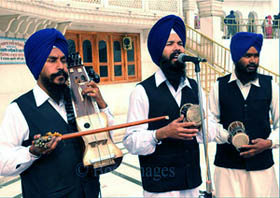Dhadhi singing finding hard to carry on its legacy
 Amritsar, Dec. 15: There was a time when Dhadhis, the traditional Sikh musicians and singers, used to educate and inspire people by singing the sagas of Gurus'' heroic deeds and valour. It was done in the service of their community.
Amritsar, Dec. 15: There was a time when Dhadhis, the traditional Sikh musicians and singers, used to educate and inspire people by singing the sagas of Gurus'' heroic deeds and valour. It was done in the service of their community.
With the passage of time, not many individuals have been volunteering to become Dhadhis. This is steadily becoming a major concern for many members of the Sikh community who wish to see the Sikh culture gain popularity and respect among the new-age children.
A majority of urban youth today finds it difficult to understand `Dhadhi'' singing.
Not many people may know today that in the early 17th century, Guru Hargobind, the 6th Sikh master, first employed `Dhadhis'' to sing heroic ballads (vaars) in his court to inspire Sikhs by acts of valour and heroism.
Today, very few Dhadhi Jathas (groups) remain to carry on the legacy. It is because there are not many youngsters who are actually interested in inheriting the legacy, as they find it not so rewarding. The new generation in Dhadhi singers'' family finds it not so motivating to take up from their family elders.
But there are a few individuals who still wish to treasure the legacy.
Bhai Kulwant Singh, an internationally renowned Dhadhi singer, has been trying hard to keep alive this dying art. He tells Dhadhi flourished during the period of the Gurus when traditional ballads of brave warriors were sung.
"The financial condition of Dhadhi singers is very bad. And this compels the children of Dhadhi singers not to carry it on further. I request the Punjab government to take serious note and promote the tradition of Dhadhi singing. They should encourage more Dhadhi programmes," Bhai Kulwant Singh, the Dhadhi Singer.
Another person upholding the Dhadhi tradition is Bhai Baldev Singh. He unified all Dhadhi Jathas (groups) in Punjab and formed `Shiromani Dhadhi Sabha'', an organization which encourages the Sikh youth to learn `Vaars''.
Bhai Baldev Singh''s Dhadhi group regularly performs at Sri Harmandir Sahib (the Golden temple) and helps in keeping alive the legacy. He believes a proper support to the fading art can trigger passion to learn it.
"Dhadhi singing is dedicated to the service of religion. Money is a secondary thing. In this modern age, every person gives priority to making money for himself, but for us service remains the priority and money, the secondary. These things (Dhadhi) can never die, but may dwindle. With the western influence in our society, a majority of children have been taking to paths that take them to securing a good income," says Baldev Singh.
A few children also come to him to be trained in playing `Dhadd'', a Punjabi folk instrument.
Baldev Singh, said: " It is not just `Dhadhi'' singers who deserve to be supported, the music also needs to be popularized among the listeners."
It is believed that the Shiromani Gurudwara Prabandhak Committee, the highest Sikh governing body, can play a vital role in encouraging the present day youth take to traditional music.
Historically, `Dhadhis'' have remained an integral part of Sikhism. They have been singing their own poetic compositions about the daring deeds of Sikh warriors and martyrs.
A Dhadhi group consists of two or three singers, one playing on the Sarangi, another playing on the Dhadh, and the third may be their leader, discoursing on the contents of their songs.
Guru Hargobind first employed the Dhadhis or musicians and instructed them to sing heroic ballads (vaars) in his court to inspire the Sikhs to take up acts of valour and heroism.
The Dhadhi-groups performed before the Sangat (public) and groups of Sikh soldiers. These groups subsequently became very popular all over the Punjab on account of the use of folk tunes and their zealous and emotional style of singing. These folk singers had hardly any knowledge of Hindustani classical music, but their appeal to the masses was irresistible.
But today it is being felt the Dhadhis'' culture is imperative to keep alive this traditional mode of educating the youth and popularizing Sikh Gurus'' lives and acts of chivalry to enable the modern-day youth to learn from their past. (ANI)